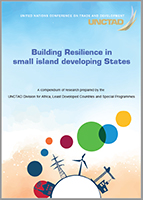The structural vulnerabilities that Small Island Developing States (SIDS) face have been further compounded by new and emerging challenges. Recently, heavy external shocks such as the COVID-19 pandemic, fluctuating global commodity prices, and waning support for multilateralism have exacerbated the long-term risks posed by climate change and unequal participation in global production networks. The need for urgent action has been brought into sharp focus.
In this respect, building the economic resilience of developing countries, and SIDS in particular, remains a daunting challenge. However, the key policy lessons that can be drawn from the pandemic are clear. Above all, “business as usual” is no longer a viable option for the most vulnerable countries. A reprise of time-worn actions will not usher in the new development outcomes desired.
The upcoming fifteenth session of the United Nations Conference on Trade and Development (UNCTAD 15) in October 2021 and the Fifth United Nations Conference on the Least Developed Countries (LDC5), which will be held in January 2022, provide the international community with an unprecedented opportunity to take stock and reimagine a stronger, more inclusive, and more sustainable future, particularly for the most vulnerable. By leveraging the transformative power of productive capacities, SIDS and other vulnerable developing countries can be better equipped to face the next generation of trade and development challenges, equipped with more options for growth, and stronger partnerships for the future.
On the road to UNCTAD 15 and LDC5, this publication aims to provide a range of analysis and policy guidance on issues of pressing concern for SIDS. For this special group of countries, growth and development must be examined through a unique policy-oriented lens. This compendium tackles trade and development challenges related to SIDS’ current productive capacities and structural transformation to date; possible alternative development strategies; tourism and sectoral linkages; and debt sustainability. It draws on the extensive research and policy analysis work carried out by UNCTAD’s Division for Africa, LDCs and Special Programmes, as well as lessons learned from our technical support to the most vulnerable countries in developing key aspects of their trade and productive structures.
UNCTAD’s Productive Capacities Index (PCI) makes an important contribution to these efforts. It is the first comprehensive attempt to measure productive capacities in all economies and construct a multidimensional, global index that can provide country-specific insights and diagnostics of productive capacity development of relevance for SIDS.
The upcoming UNCTAD 15 Conference and LDC5 should be key moments in the international conversation on how to put these transformative productive capacities at the centre of efforts to ensure a better recovery from the pandemic, breaking the structural barriers of inequality and vulnerability, and working towards a more prosperous future for all.
The challenges are many for small islands to overcome existing trade and development barriers, yet this compendium confirms UNCTAD’s role as a visionary partner to support the efforts of SIDS to address them.
The compendium identifies pressing issues, and, importantly, bold and innovative strategies for building the necessary productive capacities to support structural transformation. I am confident it will be a helpful resource for government officials, policy makers and the wider international community to design effective and sustainable programmes to support SIDS in building a more sustainable and resilient future.
Mr. Paul Akiwumi
Director, Division for Africa, LDCs
and Special Programmes, UNCTAD

